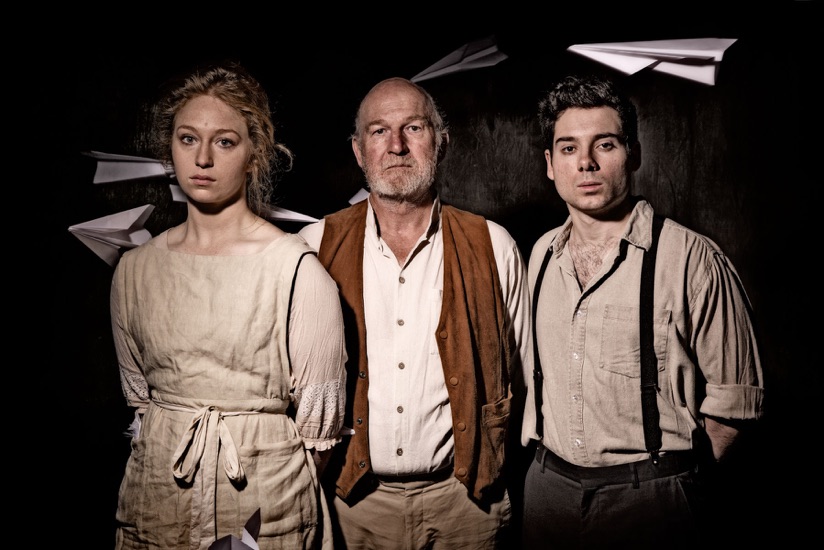There’s a lot going round on the blogosphere with regard to the latest Belvoir season.
It’s hard weighing into this one, isn’t it?
You don’t want to whinge; you don’t want to self-promote; you don’t want to cast aspersions on the work of your male peers, whom you admire as people and writers. You don’t really want to get stuck into a theatre company either, because whatever you may think of decisions made, the people who have been appointed to those positions have a perfect right to run the company the way they want to during the time they are employed to do so.
But … it WAS a moment when we saw the line up of blokes and the one woman on the ABC TV report …
For the record here is a list of female writers for the stage in Australia. We don’t know if any of them are currently in contact with Belvoir, or had any discussions with Belvoir in relation to the 2010 season.
As far as we know in terms of new work by Australian female playwrights only Alana Valentine, Jenny Kemp, Robyn Archer, Katherine Thomson, Beatrix Christian, Christine Evans, Leah Purcell (with Scott Rankin), Melissa Reeves, Linda Aronson, Val Levkowicz, Dallas Winmar, Jane Harrison, Kate Mulvaney and Julie Janson have had a mainstage gig at Belvoir Upstairs since 1985.
That’s 14 in 24 years.
As compared to 52 for men (not counting ‘company’ productions but counting both writers where a duo was concerned, as we have done for women writers). It’s possible that other Australian mainstage companies have similar track records.
We hope not.
The list below is also by no means exhaustive – it’s just those playwrights who happen to be female whose work those of us seconded to write this post know well enough to honour and who we’re certain are still writing. If we’ve missed anyone, apologies. It’ll be because we haven’t read or seen your work or because we think (possibly erroneously) you’re currently engaged in a more sensible way of making a living. But sing out if we’ve missed you! Give us a chance to make good.
We’ll start with 7-ON because that’s our tribe but there’s no particular order of merit or relevance implied.
Donna Abela, Vanessa Bates, Hilary Bell, Noëlle Janaczewska, Verity Laughton, Catherine Zimdahl, Alana Valentine, Suzie Miller, Catherine Fargher, Julie Janson, Louise Fox, Debra Oswald, Sue Smith, Leah Purcell, Elaine Acworth, Jan Cornall, Elizabeth Coleman, Beatrix Christian, Robyn Archer, Kate Smith, Ros Horin, Katherine Thomson, Linda Aronson, Van Badham, Melissa Reeves, Dallas Winmar, Catherine Fitzgerald, Rosalba Clemente, Sandra Shotlander, Angela Betzien, Delia Fetter, Karin Mainwaring, Merlinda Bobis, Jane Harrison, Mary Rachel Brown, Nicki Bloom, Patricia Cornelius, Kate Mulvaney, Jenny Kemp, Christine Evans, Heather Nimmo, Claire Heywood, Lally Katz, Tobsha Learner, Andrea Lemon, Maryanne Lynch, Val Levcowicz, Peta Murray, Hannie Rayson, Catherine Ryan, Kylie Trounson, Alma de Groen, Belinda Bradley, Angela Costi, Jane Bodie, Sally Richardson, Alison Lyssa, Chi Vu, Joanna Murray Smith, Suzanne Spunner, Jackie Smith, Andrea James, Margaret Cameron, Fiona Sprott.
Setting aside the new work by Australian male writers – because we can’t reduce this to an inter-gender competition with our male peers - is anyone seriously going to assert that not one of those women could not have written a better play than Englishwoman Polly Stenham’s adolescent-gothic That Face? (Actually, it’s quite interesting that the only female sensibility in the whole season is an adolescent one.)
There have been comments made on other blogs with regard to the number of (terrific) women on the board and in management at Belvoir). All this means - in the context of the 2010 season anyway - is that there are a great many extremely able women supporting and facilitating the creativity of a group of men.
Someone else produced statistics about the number of indigenous works programmed at Belvoir as an argument against any decision to seek a gender balance in terms of central creative roles. On the contrary, the programming of works by indigenous writers simply indicates – in the case of female writers - not that the fact that ‘things just ended up that way’ is because of limited material at a level of excellence available to go into the programming mix, but that the company has consistently been making very deliberate choices with regard to programming. And anyway, ‘things just ending up that way’ is a pretty crass definition of leadership.
We don’t think anyone is suggesting that this moment in time for Belvoir is result of any ill will. Or that it isn’t a difficult job supporting new Australian writing of any kind in an industry where the box office exercises a huge influence.
But where do we go from here? Not sure. An act of unconsciousness is a kind of betrayal. It requires either a mea culpa or an act of reparation on the part of the betrayer. Perhaps Belvoir could just say sorry and resolve to do better. Or perhaps each of those men involved in programming the 2010 season could resolve to champion at least one female Australian playwright next chance they got.
That’d be something.















